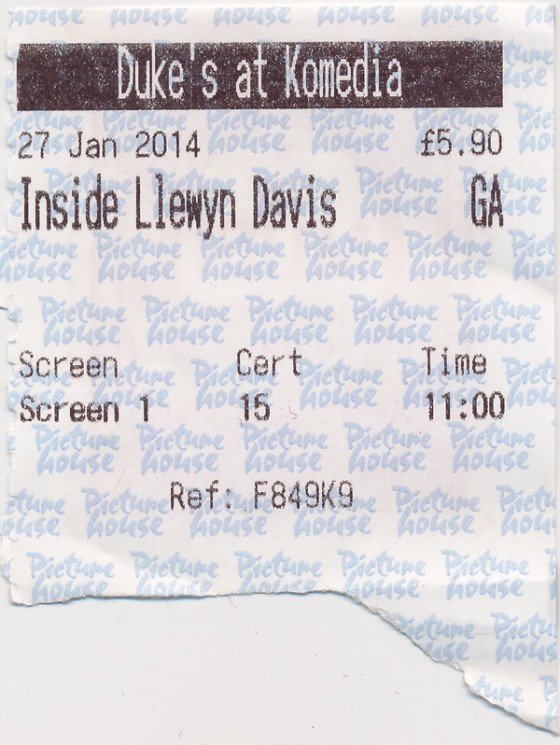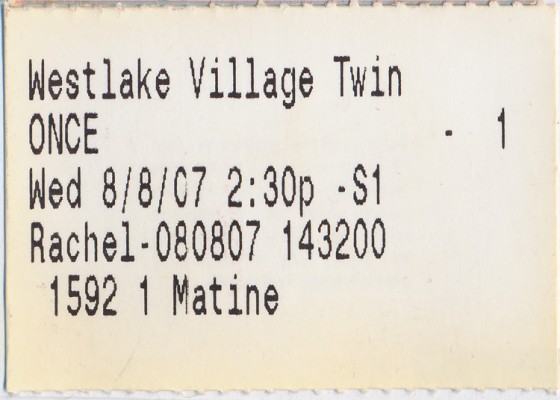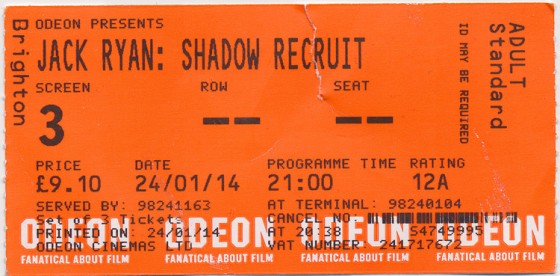Once & Jack Ryan: Shadow Recruit & Inside Llewyn Davis

Outside Llewyn Davis
It’s year round up time, so that means I have to write about films from 2007. I remember vividly seeing a video for Once (in 2007? Can you imagine? They still showed videos on cable. On Sunday nights at midnight for one hour, but still. That’s why we had TiVo (in 2003? We had TiVo? Can you imagine?)) before I saw the film. Just thirty seconds, and I shut it off. Tearing up, which happens a lot when I hear music I like, I knew I would love the film just on that, and I did.


On one hand, you could make the argument that this was a case of Three of Hearts, a not very good film that works exclusively if you believe that Ms. Sherilyn Fenn was worth throwing your life away for. I did believe that, so it did. Sadly, I did not throw away my life for Sherilyn Fenn, just for seeing her onscreen.
In the case of Once, I like the music, ergo I like the movie, so you have no reason to believe me. But it’s more than that, because this film captures, and I think better than any other film I’ve seen, which face it, is more than you, which if you believe the argument of quantity over taste, qualifies me as an expert, at least in very long sentences, what it’s like to be the music, what it’s like when it hits, even if there’s no one to hear it.
I don’t think I’ve ever seen the rawness of the creative process so neatly depicted. It took a film about music to capture what it’s like to make something new, as opposed to all those idiotic films about writer’s block (bleeccch), or worse still, filmmakers (sound of spitting out an entire Mad Magazine) to get what it’s like to flow. Yes, I’m my biggest fan, and my only reader, but there’s nothing like the surprise at having created something that you can look at like it belongs to someone else. This is the sacrament of music, and this film and the characters get it.
Plus, as a story, it’s unjustly delicate. Like Ratatouille or Stalker or Gilda, I can’t for the life of me explain how it works, like some unseen soul haloing the film itself. I look at the parts come to life and just marvel. I think the greatest indication of my love of this film is, the fact that I was actually happy it won the Oscar (for best song). I even watched them perform it (on TiVo, but still). Instead of my usual snarky self of hating something I like get popular, it was the rare case of the good guys winning, the universe aligning for just long enough to trick me into thinking it makes sense.
The Take: Once

$49.97
The invalidation of the Three of Hearts argument is, naturally enough, Inside Llewyn Davis, whose music I love, and whose film is not so hot. Obviously I express my continuing gratitude that there’s another bland film to stack the odds in favor of Gravity winning the Oscar, which I now care about because a film that deserves it might win (see Once, two sentences ago). Who knows, I may even watch it on eyeScan (you don’t have that yet. I’m watching Robot Tells Me To Kill Mankind right now!).

In reviewing the films of the 1990s, it seems in a great year (like 1994), the masters like the Coens and Mr. Woody Allen had nothing. Then again, at this point, maybe they just suck.
Inside Llewyn Davis gets that there’s something sacred about music, kinda. Watching Mr. Oscar Issacs play and sing in the opening scene, and it’s clear it’s him, gives one hope for the rest of the film. But then there’s all those scenes of people talking, and being cavalier about animals. You briefly go back to the music, and you’re okay, only dreading when they’ll start to open their mouths. It’s the opposite of the ‘watching porn’ rule – you actually want to watch the porn parts, in this case the singing; the numbers are far and away the best parts of the film. It’s when we get to the story that we run into the cheerleaders who don’t have any money to pay the pizza man. Maybe we could do something else for you. Would you accept some naked…ambition?
Cause that’s the problem. When it boils down, the film is about a crave for fame, jonesing for that next gig, a point is ever so cleverly hammered home by the throwaway inclusion of Bob Dylan at the end of the titular character’s gig and the end of the movie. Wow, the film seems to say, he could have been Dylan. Which is a double problem. The first is that even Dylan was never really Dylan. I cribbed this line from a long ago review of the equally unfortunately titled band Bright Eyes and their/his ‘I’m Wide Awake, It’s Morning’. The point being it was a great record, even if there was another guy who played guitar at some point in history. Dylan not being Dylan could be an interesting film in itself, and was.
The second point being that fame is not art. Poor Llewyn Davis, if he was successful, then he would understand the soul of music. It’s all the enjoyment of watching American Idol with none of the guilt of being the kind of person (yuk!) who would enjoy watching American Idol.
Right. Just explained the critical success of the film. Now go thee to getting to make an art film version of Honey Boo Boo and that statuette is all yours.
Please don’t do that.
The unfortunate inclusion of Dylan at the end makes this a kind of simultaneously unfunny and untragic Life of Brian. The point of adoration that the Python folks understood so well was the adorers, not the adored. Which means that you either make him either a schlep or a true dick, but not someone halfway in-between. I mean, the character’s kinda an asshole, just not enough that you’d actually like him.
And since we’re speaking of the adorers, there’s a second thing that I noticed about this film which has to do with having just seen Jack Ryan: I can’t see anything. It’s so dark. Someone turn on the lights.


You could look at Jack Ryan: Shadowy Shadows of Darkness and say Ms. Keira Knightley is The Whiner and the Hostage, and it violates the equally idiotic as that which it is trying to criticize Betchel Test. But more to the point is the way in which Mr. Kevin Costner is equally an object, as he sits in the window waiting for Mr. Chris Pine to recover from his wounds as if He’s The Only One Who Could Ever Be A CIA Agent.
Whether female or male, there’s very palatable solipsism at work here, that the other characters wouldn’t exist without Mr. Pine’s grace, and the sense that things don’t happen, so much as happen to him. Saving the United States from a terrorist attack is fine, I guess, but if someone else is going to defuse the bomb, better just to let it go off.
The Take: Jack Ryan: Shadow Recruit

Almost made it.
-$0.70
Which, honestly, is no different than the Berkeleyian titled Inside Llewyn Davis, as if there could be nothing outside. And, no, I didn’t throw my ice cream cup at the screen and say ‘I refute you thus!’, and yes, this manifests in him being an asshole to the cat, even running it over at one point, and he should no doubt be killed horribly according to the Road Warrior rule and so forth.


But I didn’t feel that way, I think because the cat wasn’t real, man. Nothing exists outside Llewyn Davis, except characters to test, or teach, or nag, or obstacle. How appropriate that the cat is named Ulysses, another story with the same solipsistic structure. And yes, we’re supposed to worship Gatsby and Homer without asking if it’s actually good writing.
And I’m tempted to insert a ‘hint, hint’ there, but the Coen brothers have given me a lot more pleasure over the years than most or any and they deserve the praise they get. I’m not mad, so much as I am selfish. Because here’s a part of the process that Once didn’t capture music, when it doesn’t flow. And I know that it’s random, that it sings when it wants to, and you never know, even when it’s happening. So instead of a cheap dig, here’s to music, whenever and wherever and inexplicably it strikes.
The Take: Inside Llewyn Davis

$0.00
The Lonely Comments Section

 [logo]
[logo]

